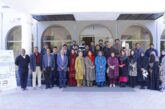
Media Tracker lists the challenges and achievements of the journalists and media organisations worldwide. Here’s a list of journalism at risk stories in the recent month. We would like to thank international media protection organisation and news outlets for their content.
- Gui Minhai, a Chinese-born Swedish publisher and bookseller, is a victim of Chinese government’s continued persecution. In 2015, Gui was one of five Hong Kong booksellers to be abducted and detained by the Chinese authorities. Freed last, Gui was kept under close surveillance and arrested last weekend, by plainclothesmen as he travelled in a train with two Swedish diplomats to receive treatment in Beijing for his serious health problems.So far there is no official response from the Chinese authorities. In 2017, Liu Xiaobo, a Nobel peace laureate and winner of the RSF Press Freedom Prize, and the blogger Yang Tongyan died last year from untreated ailments during Chinese detention. China is ranked 176th out of 180 countries in RSF’s 2017 World Press Freedom Index. (RSF)
- Turkish government admits to have detained 24 journalists for their social media posts, critical of the Operation Olive Branch; Turkish military operation launched over the weekend on the Syrian town of Afrin. The chief prosecutor office is currently investigating a total of 57 individual for their social media posts. The arrests have been made on charges of spreading terrorist propaganda via social media… insulting the president,’ publicly degrading the Turkish Nation; the State of the Turkish Republic, its military and spreading propaganda for a terrorist organization,’The government raided the homes of prominent journalists T24 columnist and founder member of the Diyarbakır Political and Social Research Institute (DISA), Nurcan Baysal and, Halkın Nabzı (The Public’s Pulse) weekly newspaper’s Editor in Chief, Ishak Karakaş, and took them into custody last week as part of the investigations across Istanbul and Diyarbakır. Both Nurcan and Ishak are in custody at the anti-terror department for their social media comments about Afrin.The residence of the dissident writer Aziz Tunç, who is under a self-imposed exile for two years, was also raided. The police confiscated personal notes, manuscripts and a book on the victims of Ankara’s deadly attacks from the writer’s home. Former Dihaber reporter İsmail Eskin’s home was also raided and searched while his relatives were questioned. İsmail was out of the country.Although the exact number of people taken into custody was unclear, news reports said 30 people had been detained in Diyarbakır alone.Also on Monday, the Afrika newspaper of Northern Cyprus became the target of a mob attack following its headline in which it called the Afrin operation Yet Another Occupation by Turkey. The mob attack came after President Recep Tayyip Erdoğan called the newspaper’s headline, a “dirty headline.” (IFEX)
- Australian government’s recent addition of secrecy and espionage provisions from a proposed national security law threatens journalists, who risk being sent to prison just for doing their job.The Australian media representatives appealed to the parliament that the expanded definition of espionage was flawed, which would consist not only of communicating classified information but also receiving and possessing it. They drew a parallel between the bill and the situation in Turkey, where a Wall Street Journal reporter, while covering the conflict in Kurdistan, received 2-year’s imprisonment on terrorist propaganda charge for interviewing members of the outlawed Kurdistan Workers’ Party (PKK). If the bill were passed in its present form, journalists could face up to five years for being in possession of sensitive documents in the public interest and up to 15 years for communicating them.(IFEX)




